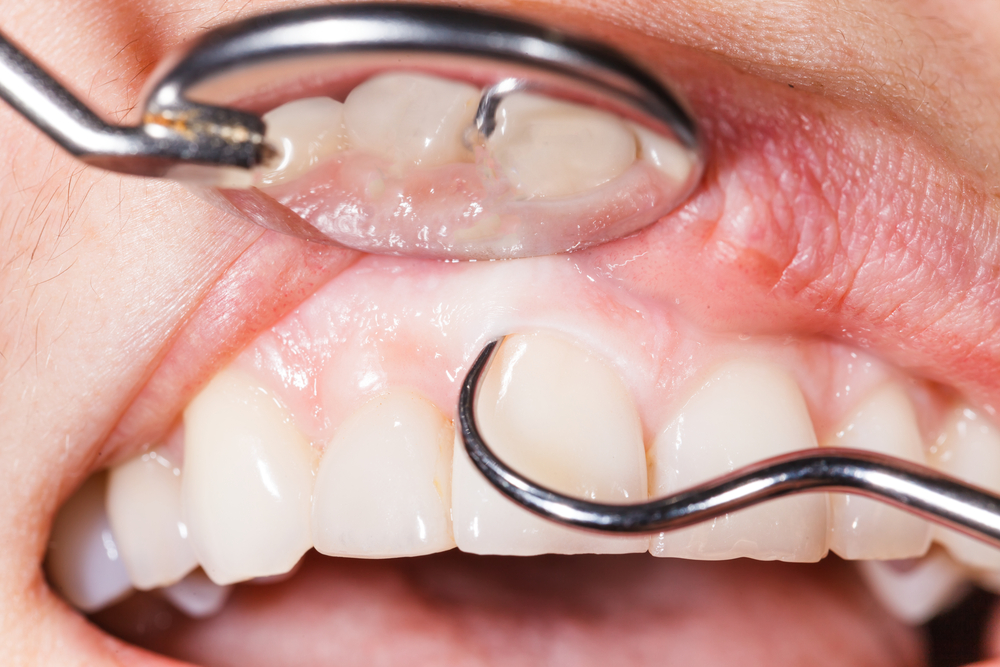
Gingivectomy and gingivoplasty are both dental surgical procedures used to treat periodontal disease and other gum-related issues. Periodontal disease takes form when there is an infection of the gums, tissue, and bone that hold your teeth in place. While this disease can be effectively treated if caught early enough, neglecting to treat gum disease will ultimately result in tooth loss.
Read on to learn more about both treatments and what type of gum-related issues they can correct when performed by a trusted and experienced dental professional.
What Is Periodontal Disease?
Periodontal disease starts with bacteria already present in the mouth attaching to the teeth. This bacteria collects and multiplies, forming a biofilm called plaque. If it’s not removed by routine brushing and flossing, the gingival tissues can become inflamed, which results in the development of gum disease. Gingivitis is the earliest stage of gum disease.
The best way to prevent gingivitis is by flossing daily and brushing with fluoride toothpaste twice daily. Only excellent oral hygiene practices can remove plaque and food debris, and it’s the best way to eliminate bacterial plaque at the gum line. If plaque and food debris are not removed, gingivitis will worsen, and the gum tissue will continue to become more inflamed. Bleeding and discomfort can also occur, and the area between the teeth and gum tissue deepens. Once periodontal pockets form, bacteria continue to accumulate and moves below the gum line. At this point, periodontal disease can affect the teeth’ roots, and they can become infected. Teeth may loosen or become uncomfortable, and it is at this point where a gingivectomy is necessary.
Benefits of a Gingivectomy
The gingivectomy process is the total removal of a portion of your gums from in and around a single tooth or multiple teeth. The treatment is performed to treat gum disease or lengthen the height or width of a tooth or teeth section. This technique should only be performed by a general dentist who has specific training in periodontal surgery.
Benefits of a gingivectomy include:
- All diseased tissue is removed
- Pocket depth is reduced
- Gum disease is treated
- The ability to maintain good oral hygiene is improved
- The risk of tooth and bone loss is reduced
- Overall oral health is improved
Benefits of a Gingivoplasty
Another type of periodontal surgery is called a gingivoplasty. A gingivoplasty differs slightly from a gingivectomy as it only involves partial removal of the gums. During a gingivoplasty, dentists can reshape the gum tissue around the teeth. This treatment is often done to make the gums more visually appealing and to look more natural. A gingivoplasty is commonly recommended for patients looking to correct a gummy smile rather than treating gum disease specifically.
A gingivoplasty can correct the following:
- A gummy smile
- Uneven gingival contours
- The loss of the small gum tissue between the teeth
- Exposed tooth root surfaces
How Treatments Are Performed
Both surgeries are completed with a surgical scalpel or a low-frequency laser. A local anesthetic is used to keep patients comfortable during both treatments. The diseased tissue is trimmed and removed, the remaining gums are reattached in and around the teeth by stitches, and the area is cleaned with saline and other antibacterial rinses. Once the procedure is complete, a surgical dressing is placed in and around the teeth and gums. This dressing is left in place for about a week while the gums continue to heal. Your provider will likely prescribe an antibacterial mouth rinse to help promote healing.
Are Gingivectomy and Gingivoplasty Treatments Covered By Insurance?
If either procedure is performed solely for cosmetic purposes, it is unlikely that dental insurance will cover the treatment. However, if either of these treatments are required from a medical standpoint, they are typically covered to treat periodontal disease. If you are suffering from periodontal disease symptoms and would like to learn more about treatments for preventing future tooth loss, contact Hoffman Dental Care today.




